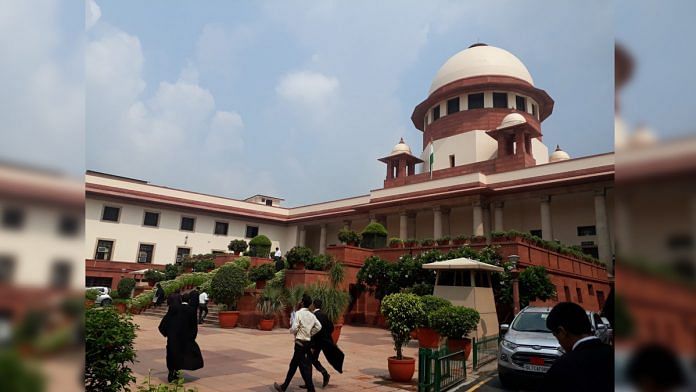New Delhi: The Supreme Court collegium is said to have cleared nine names late Tuesday night, including three women as judges of the top court, one of whom will likely become the first woman Chief Justice of India (CJI).
Amongst them is also a senior advocate who will fill the vacancy created by the retirement of Justice R.F. Nariman last week.
The collegium is a high-powered appointment panel led by the Chief Justice of India and comprises four senior judges of the top court. At present, it is headed by CJI N.V. Ramana and has justices U.U. Lalit, A.M. Khanwilkar, D.Y. Chandrachud and L.N. Rao as its members.
The formal resolution of the collegium decision was not uploaded till the time of this story being published.
Tuesday’s development comes almost 22 months since the top court last recommended names for elevation. During the tenure of CJI S.A. Bobde, the collegium could not finalise any names due to a lack of consensus over the candidates.
Also read: SC hits out at govt for HC vacancies, says no decision on collegium-cleared names ‘for years’
SC set to have most number of women judges ever
Justices Hima Kohli, B.V. Nagarathna and Bela Trivedi are the three women judges to be recommended. With their appointment, the top court will for the first time in its history have four women judges. ThePrint had in March reported that these judges were under consideration.
At present there is only one woman judge, Justice Indira Banerjee, who is due to retire on 8 November 2022.
Justice Kohli is the only women judge to head a high court as its Chief Justice. She presently heads the Telangana High Court and was earlier with the Delhi High Court.
Justice Nagarathna’s elevation will likely give India its first woman CJI in 2027. However, in case she is sworn in after Justice Vikram Nath, who has also been recommended by the colleguim, she will hold office for just over a month — from 23 September to 29 October in 2027. A Supreme Court judge can hold the CJI’s office only till the age of 65 years.
Justice Trivedi’s appointment is unique given that she will be the only judge in the Supreme Court with the experience of working in the subordinate judiciary as well.
Prior to this, Justices R. Banumathi and C. Nagappa had this distinction.
Justice Nagarathna currently serves in the Karnataka High Court and Justice Trivedi is a senior judge of the Gujarat High Court.
In May this year, ThePrint had reported on the difference of opinion between the collegium members under CJI Bobde’s tenure over the elevation of Justice Nagarathna. While the former CJI was keen to elevate her, considering she would become the first woman CJI, some members felt she should not be allowed to supersede the elevation of the chief justice of the Karnataka High Court, Justice Abhay Oka.
However, CJI Bobde was of the view that Justice Oka — whose parent high court is Bombay — could only be elevated once Bobde himself retires since there were already four judges from the same high court at the time, including him.
The collegium has presently recommended both Justice Nagarathna and Justice Oka for the apex court bench. The other judges whose names were cleared are Justices Vikram Nath, J.K. Maheswari, C.T. Kumar and M.M. Sundaresh.
Justice Nath is the chief justice of the Gujarat High Court, Justice Maheshwari heads the Sikkim High Court while Justice Ravikumar is the second most senior judge of the Kerala High Court. Justice Sundaresh is the third senior most judge of the Madras High Court.
Senior advocate P. Narasimha is the collegium’s choice from the Bar. The former additional solicitor general has marked his appearances in several important matters, including the Ram Janmabhoomi-Babri Masjid land dispute case. He represented Mahant Ramachandradas, one of the Hindu representatives in the title suit.
He is also the amicus curiae in the BCCI matter and played a crucial role in settling the differences between the Committee of Administrators and the cricket body.
Narasimha is also closely associated with the Centre for Shastric Studies and Research in Law, an exclusive department at Nagpur’s National Law University that imparts knowledge about ancient Indian logic and how to apply it to analyse legal propositions.
This report has been updated to clarify how long a term Justice Nagarathna could have as Chief Justice of India.
(Edited by Manasa Mohan)
Also read: India’s higher judiciary lacks professional diversity. It’s now a monopoly of lawyer-judges



